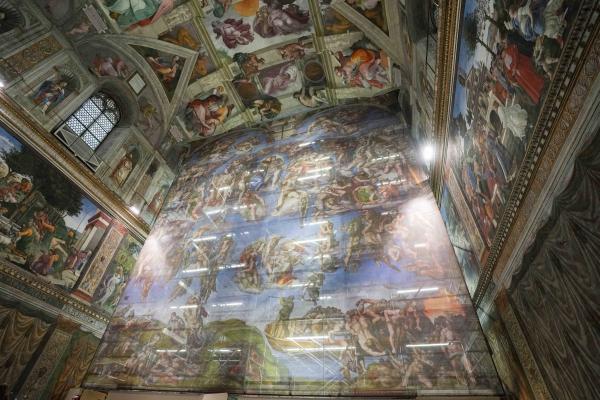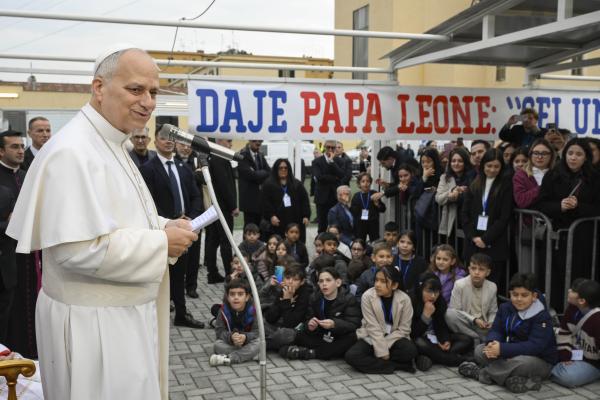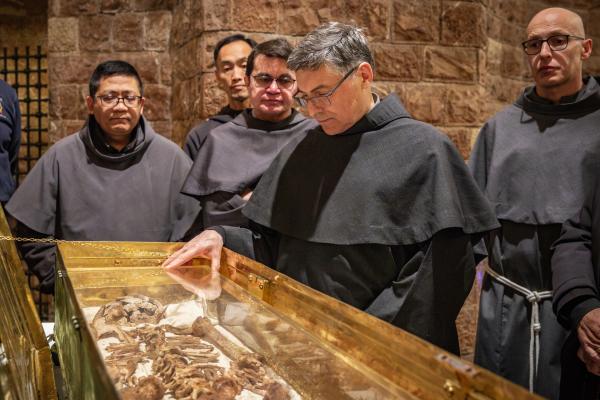Mission to Mongolia: Pope will encourage tiny flock, promote harmony
Pope Francis heads to Mongolia next week, a country where missionaries returned only in 1991. Today, the Catholic community numbers about 1,450 people while most people who claim any religious belief are Buddhists.
 Cindy Wooden
Cindy Wooden
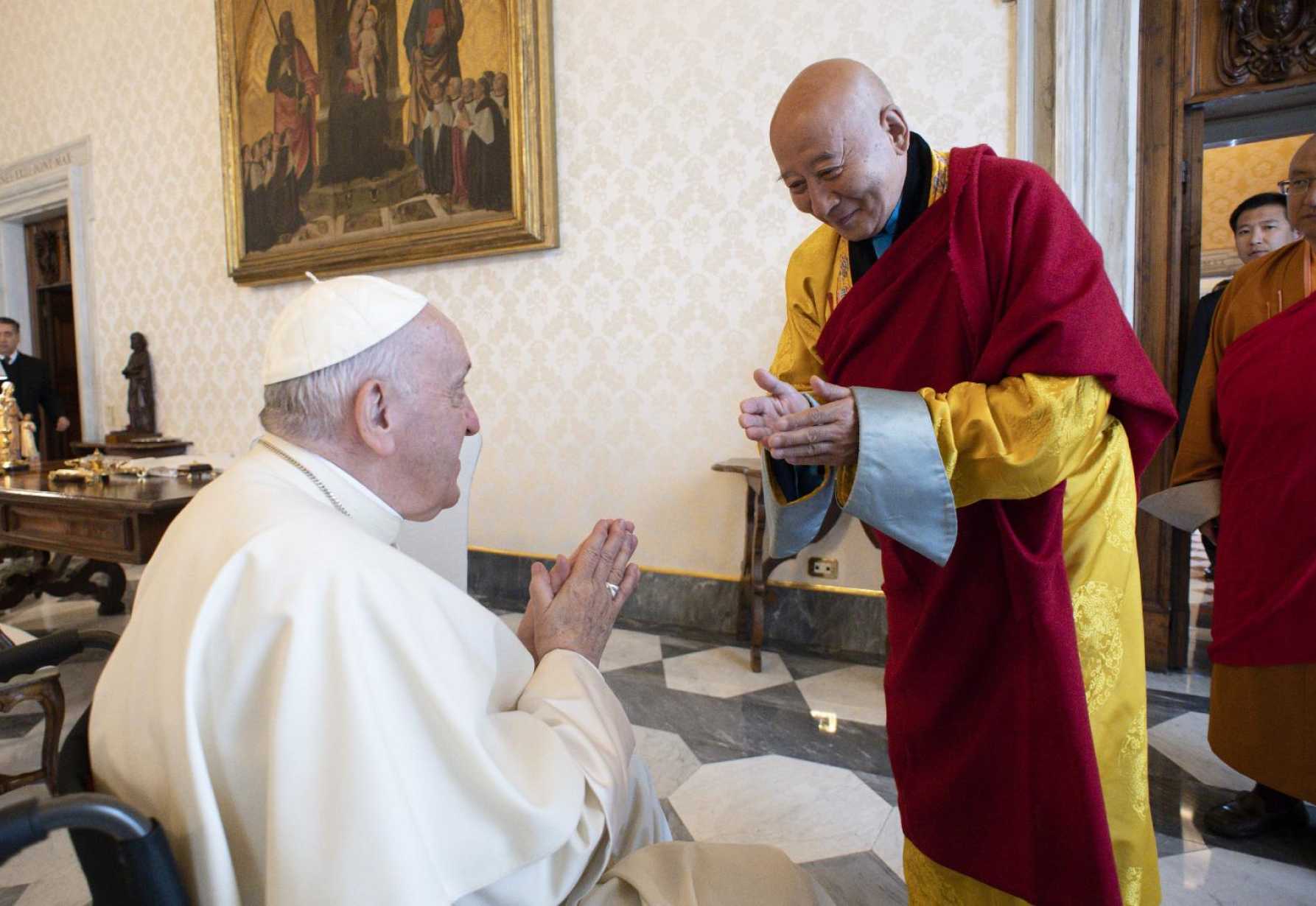
Pope Francis greets Buddhist leaders from Mongolia during an audience at the Vatican May 28, 2022. (CNS photo/Vatican Media)
VATICAN CITY (CNS) -- Pope Francis continually calls Catholics to go to the "peripheries," and that is exactly what he will do Aug. 31 when he boards a plane to Mongolia.
Bordering both Russia and China, Mongolia is one of the few countries St. John Paul II did not manage to visit, although plans were well underway for such a visit in 2003 when the well-traveled Polish pope also had hoped to make a brief "technical stop" in Kazan, Russia, to return to the Russia Orthodox Church the famed icon of Our Lady of Kazan.
St. John Paul's failing health, the Russian Orthodox patriarch's lack of enthusiasm and the logistical challenges of a very small Catholic community hosting a papal visit all contributed to the plan being scratched.
Pope Francis, who is scheduled to be in Mongolia Sept. 1-4, will visit a Catholic community that has grown from fewer than 200 members in 2003 to some 1,450 today.
When St. John Paul missed the trip, he sent a cardinal to ordain the first bishop for the Apostolic Prefecture of Ulaanbaatar, the jurisdiction -- smaller than a diocese -- that continues to cover the entire nation. Mongolia now has its own cardinal, the 49-year-old Cardinal Giorgio Marengo, who has served as a missionary in Mongolia for more than 20 years.
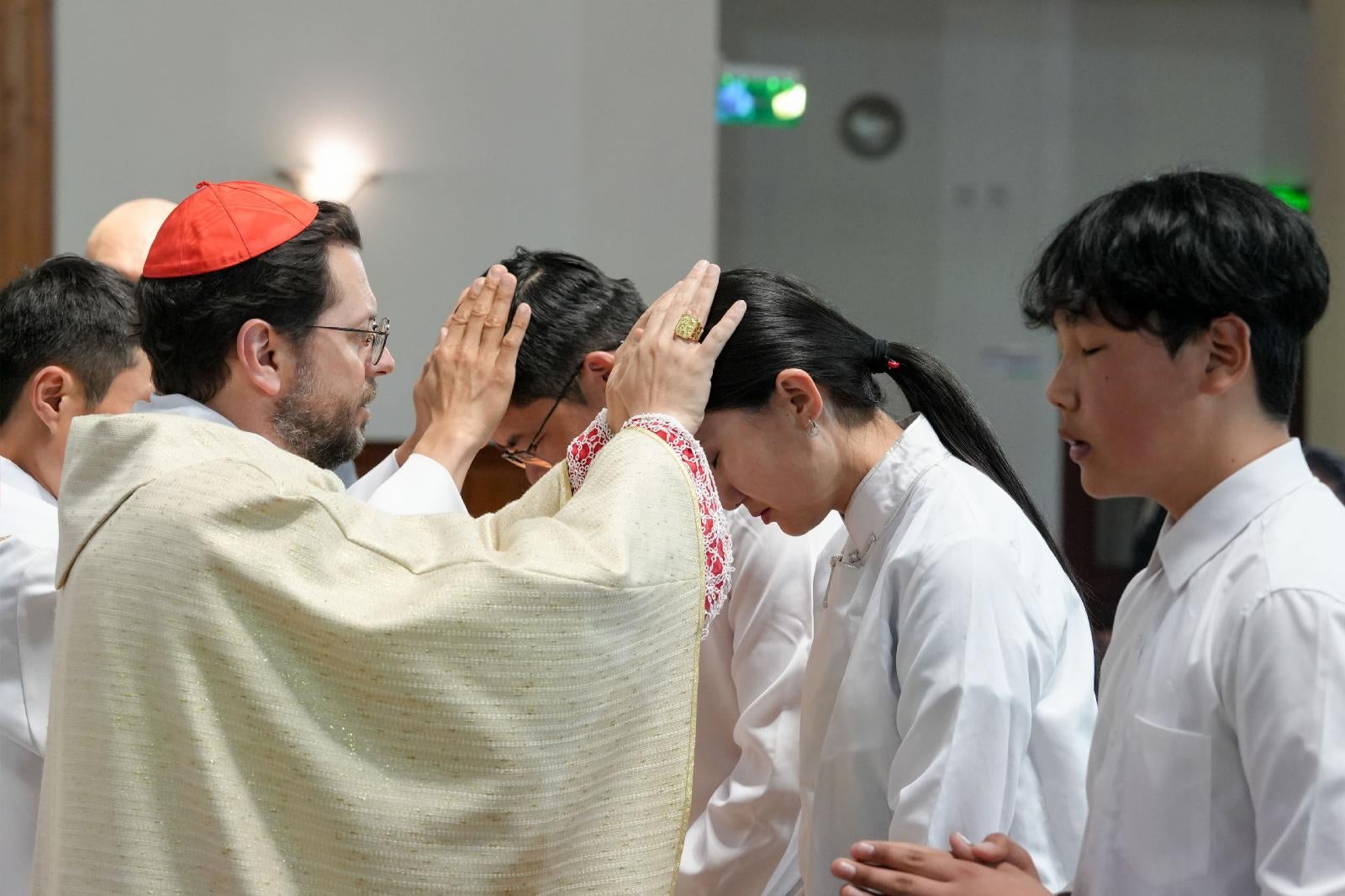
While in Rome in mid-July for a conference on catechesis, Cardinal Marengo said "whisper" was the best verb to describe missionary activity in Mongolia.
Whispering is a "means of profound and respectful communication, which can occur only in the context of a relationship of friendship," he said. "One does not whisper to the first person (he meets) on the street; otherwise, you will be taken for a fool. You whisper to a friend, to a person you love."
Mongolia, with 3.3 million inhabitants, is a sparsely populated country of vast distances where Soviet-influenced communist rule lasted close to 70 years and included the harsh suppression of religion, including the killing of Buddhist monks.
According to the U.S. State Department, in the country's national census in 2020, more than 40% of Mongolians said they had no religious identity. Of the 60% percent who said they were religious, some 87% said they were Buddhist, just over 5% were Muslim, 4% followed traditional Mongolian religion, usually referred to as "shamanism," and just over 2% were Christians.
According to Fides, the news agency of the Dicastery for Evangelization, the small Catholic community counts two Mongolia-born priests. It has nine churches and chapels -- including a ger (sometimes referred to as a yurt) and a cathedral of brick and mortar modeled after the traditional Mongolian dwelling. The people are served by 30 women religious and 25 religious-order priests from a variety of countries.
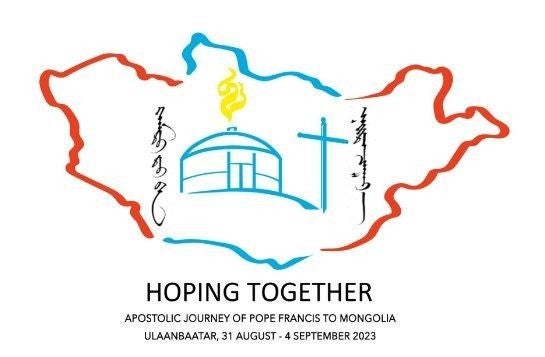
Close to 28% of the population lives below the national poverty line, according to the Asian Development Bank.
Cardinal Marengo told Fides in August that about 70% of the Catholic Church's time and resources in Mongolia are devoted to charity and social activities, including running day-care centers, a trade school, homes for orphaned or homeless children and soup kitchens.
Pope Francis' last appointment in Mongolia is scheduled to be a meeting Sept. 4 with charity workers and the inauguration of the House of Mercy, which will house a shelter for women and children escaping domestic abuse and offer temporary housing to migrants forced to return to Mongolia.
The U.N. International Organization for Migration country report for Mongolia estimates one in 11 Mongolians are living outside the country, and those leaving tend to be young, educated and skilled.
But the organization also drew attention to "internal migration," people leaving their traditionally nomadic lives as herders and moving into the city. The population of Ulaanbaatar, now estimated at 1.6 million people -- half the country's population -- is more than double what it was in 2000. The urban influx has been pushed by a search for economic opportunities, particularly in light of fast-growing desertification from climate change and overgrazing and environmental degradation caused by mining for coal, copper, gold and other minerals.
The situation is a perfect setting for Pope Francis to talk about the importance of "integral ecology" as proposed by Catholic social teaching, recognizing how the preservation of the natural environment also means preserving Mongolian culture, the dignity of its people and their livelihoods.
In showing respect for his hosts and encouraging the small Mongolian Catholic flock, Pope Francis will need to honor traditional Mongolian culture, just as Cardinal Marengo and the other missionaries have tried to do.
"Sometimes Christianity in Mongolia is considered something recent, new and imported," the cardinal told Fides, but "the Christian faith has very ancient roots" in the region, going back to the seventh century, and "we also know that in the era of the great empire of Genghis Khan, some commanders, soldiers were of the Christian faith." The great emperor died in 1227.
In the 1920s, the Vatican formally established mission structures in Mongolia, but within a year of the country becoming communist, it ceased to function. It wasn't until 1991 that Catholic missionaries returned and began rebuilding the community.
Pope Francis is scheduled to hold an ecumenical and interreligious meeting on the morning of Sept. 3 before celebrating Mass with the country's Catholic community.
While a variety of other Christian missionaries are expected to attend, the Buddhist delegation is expected to be the most significant.
Pope Francis had met at the Vatican in May 2022 with Buddhist leaders from the country. He told them that even though the Catholic community in Mongolia is small, "the church is fully committed to fostering a culture of encounter, in imitation of her master and founder, who commanded his disciples: 'Love one another as I love you.'"
"Let us strengthen our friendship for the benefit of everyone," the pope told his guests.
Citing Mongolia's "ancient history of harmony in diversity," Pope Francis told them he hoped such attitudes would grow "through the effective implementation of religious freedom and the promotion of joint initiatives for the common good."

